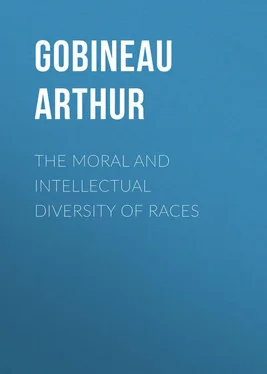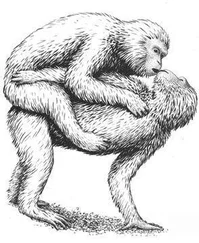Arthur Gobineau - The Moral and Intellectual Diversity of Races
Здесь есть возможность читать онлайн «Arthur Gobineau - The Moral and Intellectual Diversity of Races» — ознакомительный отрывок электронной книги совершенно бесплатно, а после прочтения отрывка купить полную версию. В некоторых случаях можно слушать аудио, скачать через торрент в формате fb2 и присутствует краткое содержание. Жанр: История, foreign_antique, foreign_prose, на английском языке. Описание произведения, (предисловие) а так же отзывы посетителей доступны на портале библиотеки ЛибКат.
- Название:The Moral and Intellectual Diversity of Races
- Автор:
- Жанр:
- Год:неизвестен
- ISBN:нет данных
- Рейтинг книги:4 / 5. Голосов: 1
-
Избранное:Добавить в избранное
- Отзывы:
-
Ваша оценка:
- 80
- 1
- 2
- 3
- 4
- 5
The Moral and Intellectual Diversity of Races: краткое содержание, описание и аннотация
Предлагаем к чтению аннотацию, описание, краткое содержание или предисловие (зависит от того, что написал сам автор книги «The Moral and Intellectual Diversity of Races»). Если вы не нашли необходимую информацию о книге — напишите в комментариях, мы постараемся отыскать её.
The Moral and Intellectual Diversity of Races — читать онлайн ознакомительный отрывок
Ниже представлен текст книги, разбитый по страницам. Система сохранения места последней прочитанной страницы, позволяет с удобством читать онлайн бесплатно книгу «The Moral and Intellectual Diversity of Races», без необходимости каждый раз заново искать на чём Вы остановились. Поставьте закладку, и сможете в любой момент перейти на страницу, на которой закончили чтение.
Интервал:
Закладка:
The inventors of this thesis did not perceive its bearing. They considered it as an excellent means for illustrating the doctrine of morality, which, as is well known, was the sole aim of their historical writings. In their narratives of events, they were so strongly preoccupied with showing the happy rewards of virtue, and the disastrous results of crime and vice, that they cared little for what seemed to furnish no illustration. This erroneous and narrow-minded system often operated contrary to the intention of the authors, for it applied, according to occasion, the name of virtue and vice in a very arbitrary manner; still, to a great extent, the severe and laudable sentiment upon which it was based, excuses it. If the genius of a Plutarch or a Tacitus could draw from history, studied in this manner, nothing but romances and satires, yet the romances were sublime, and the satires generous.
I wish I could be equally indulgent to the writers of the eighteenth century, who made their own application of the same theory; but there is, between them and their teachers, too great a difference. While the ancients were attached to the established social system, even to a fault, our moderns were anxious for destruction, and greedy of untried novelties. The former exerted themselves to deduce useful lessons from their theory; the latter have perverted it into a fearful weapon against all rational principles of government, which they stigmatized by every term that mankind holds in horror. To save societies from ruin, the disciples of Voltaire would destroy religion, law, industry, commerce; because, if we believe them, religion is fanaticism; laws, despotism; industry and commerce, luxury and corruption.
I have not the slightest intention of entering the field of polemics; I wished merely to direct attention to the widely diverging results of this principle, when applied by Thucydides, or the Abbé Raynal. Conservative in the one, cynically aggressive in the other, it is erroneous in both.
The causes to which the downfall of nations is generally ascribed are not the true ones, and whilst I admit that these evils may be rifest in the last stages of dissolution of a people, I deny that they possess in themselves sufficient strength, and so destructive an energy, as to produce the final, irremediable catastrophe.
CHAPTER II.
ALLEGED CAUSES OF POLITICAL CATASTROPHES EXAMINED
Fanaticism – Aztec Empire of Mexico. – Luxury – Modern European States as luxurious as the ancient. – Corruption of morals – The standard of morality fluctuates in the various periods of a nation's history: example, France – Is no higher in youthful communities than in old ones – Morality of Paris. – Irreligion – Never spreads through all ranks of a nation – Greece and Rome – Tenacity of Paganism.
Before entering upon my reasons for the opinion expressed at the end of the preceding chapter, it will be necessary to explain and define what I understand by the term society. I do not apply this term to the more or less extended circle belonging to a distinct sovereignty. The republic of Athens is not, in my sense of the word, a society; neither is the kingdom of Magadha, the empire of Pontus, or the caliphat of Egypt in the time of the Fatimites. These are fragments of societies, which are transformed, united, or subdivided, by the operation of those primordial laws into which I am inquiring, but whose existence or annihilation does not constitute the existence or annihilation of a society. Their formation is, for the most part, a transient phenomenon, which exerts but a limited, or even indirect influence upon the civilization that gave it birth. By the term society, I understand an association of men, actuated by similar ideas, and possessed of the same general instincts. This association need by no means be perfect in a political sense, but must be complete from a social point of view. Thus, Egypt, Assyria, Greece, India, China, have been, or are still, the theatres upon which distinct societies have worked out their destinies, to which the perturbations in their political relations were merely secondary. I shall, therefore, speak of the fractions of these societies only when my reasoning applies equally to the whole. I am now prepared to proceed to the examination of the question before us, and I hope to prove that fanaticism, luxury, corruption of morals, and irreligion, do not necessarily occasion the ruin of nations.
All these maladies, either singly or combined, have attacked, and sometimes with great virulence, nations which nevertheless recovered from them, and were, perhaps, all the more vigorous afterward.
The Aztec empire, in Mexico, seemed to flourish for the especial glory and exaltation of fanaticism. What can there be more fanatical than a social and political system, based on a religion which requires the incessant and profuse shedding of the blood of fellow-beings? 31Our remote ancestors, the barbarous nations of Northern Europe, did indeed practise this unholy rite, but they never chose for their sacrifices innocent victims, 32or, at least, such as they considered so: the shipwrecked and prisoners of war, were not considered innocent. But, for the Mexicans, all victims were alike; with that ferocity, which a modern physiologist 33recognizes as a characteristic of the races of the New World, they butchered their own fellow-citizens indiscriminately, and without remorse or pity. And yet, this did not prevent them from being a powerful, industrious, and wealthy nation, who might long have continued to blaspheme the Deity by their dark creed, but for Cortez's genius and the bravery of his companions. In this instance, then, fanaticism was not the cause of the downfall. 34
Nor are luxury or enervation more powerful in their effects. These vices are almost always peculiar to the higher classes, and seldom penetrate the whole mass of the population. But I doubt whether among the Greeks, the Persians, or the Romans, whose downfall they are said to have caused, luxury and enervation, albeit in a different form, had risen to a higher pitch than we see them to-day in some of our modern States, in France, Germany, England, and Russia, for instance. The two last countries are especially distinguished for the luxury prevalent among the higher classes, and yet, these two countries seem to be endued with a vitality much more vigorous and promising than most other European States. In the Middle Ages, the Venetians, Genoese, Pisanese, accumulated in their magazines the treasures and luxuries of the world; yet, the gorgeous magnificence of their palaces, and the splendid decorations of their vessels, did certainly not diminish their power, or subvert their dominion. 35
Even the corruption of morals, this most terrible of all scourges, is not necessarily a cause of national ruin. If it were, the prosperity of a nation, its power and preponderance, would be in a direct ratio to the purity of its manners; and it is hardly necessary to say that this is not the case. The odd fashion of ascribing all sorts of imaginary virtues to the first Romans, is now pretty much out of date. 36Few would now dare to hold up as models of morality those sturdy patricians of the old school, who treated their women as slaves, their children as cattle, and their creditors like wild beasts. If there should still be some who would defend so bad a cause, their reasoning could easily be refuted, and its want of solidity shown. Abuse of power, in all epochs, has created equal indignation; there were deeper reasons for the abolition of royalty than the rape of Lucretia, for the expulsion of the decemvirs than the outrage of Appius; but these pretexts for two important revolutions, sufficiently demonstrate the public sentiment with regard to morals. It is a great mistake to ascribe the vigor of a young nation to its superior virtues; since the beginning of historical times, there has not been a community, however small, among which all the reprehensible tendencies of human nature were not visible, notwithstanding which, it has increased and prospered. There are even instances where the splendor of a state was owing to the most abominable institutions. The Spartans are indebted for their renown, and place in history, to a legislation fit only for a community of bandits. [38]
Читать дальшеИнтервал:
Закладка:
Похожие книги на «The Moral and Intellectual Diversity of Races»
Представляем Вашему вниманию похожие книги на «The Moral and Intellectual Diversity of Races» списком для выбора. Мы отобрали схожую по названию и смыслу литературу в надежде предоставить читателям больше вариантов отыскать новые, интересные, ещё непрочитанные произведения.
Обсуждение, отзывы о книге «The Moral and Intellectual Diversity of Races» и просто собственные мнения читателей. Оставьте ваши комментарии, напишите, что Вы думаете о произведении, его смысле или главных героях. Укажите что конкретно понравилось, а что нет, и почему Вы так считаете.












